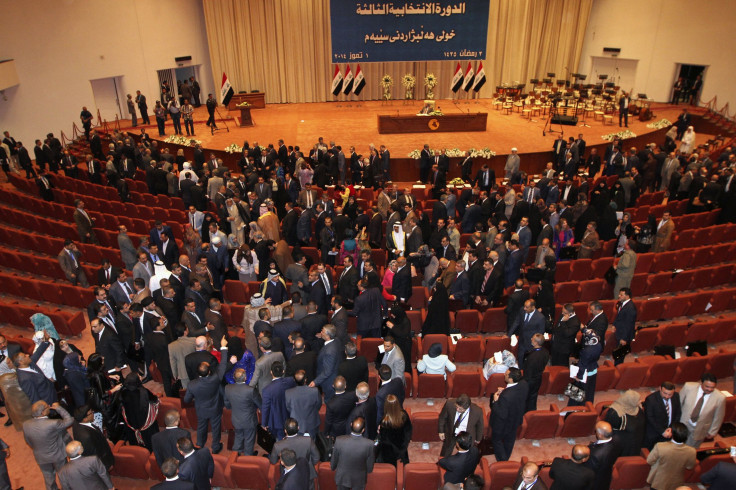In The Face Of Expanding ISIS Caliphate, Iraqi Parliament Takes Weeklong Break It Can't Afford

Just one day after the Islamic State of Iraq and Syria (ISIS), which changed its name to the Islamic State, declared the formation of an Islamic caliphate on a sizable chunk of Iraqi territory, Iraq's leaders met Wednesday to begin the process of forming a new government -- one that was supposed to include all political and ethnic parties. But just a few hours into the meeting, Sunni and Kurdish leaders walked out, forcing the assembly to take a week off, and leaving the country in political limbo. And that's with the radical Islamist group, noted for its brutality, still threatening the capital.
But a week, experts said, is something that the government does not have if it wants to save the capital, and the Iraqi people, from an insurgency that has already forced hundreds of thousands to flee. ISIS has advanced on several key towns in the last two weeks, seizing some on the border of Jordan and near the oil-rich lands in the north. And Tuesday, it vowed to expand the caliphate, calling on Muslims everywhere to support the fight. The international community, in particular the U.S., has pushed the Iraqi government to come together to fight off the Sunni insurgency, but it has so far failed to reach that juncture.
Prime Minister Nouri al-Maliki, a member of the country's Shia majority, has been unable to rally his own troops, Judith Yaphe, professor at the George Washington University's Elliot School, said.
The weeklong recess is “shocking because it comes in the face of such a critical disaster, but it shows you how divided people are. Maliki’s own coalition doesn’t want to support him,” she said.
The Sunni and Kurdish representatives who walked out of the meeting said they would not put forward their candidates for consideration until the Shiites picked a premier. Under Iraq’s governing system, the country’s prime minister is a member of the Shiite majority, the speaker of the parliament a Sunni and the president a Kurd.
Maliki’s Shiite-led State Law Coalition bloc won the most seats -- 92 out of 328 -- in the April parliamentary election, which was supposed to give him a third term in office. But since the ISIS insurgency began more than two weeks ago, Iraqi and international leaders have condemned the prime minister for refusing to form an emergency government that would have likely eased political tensions in the country. Both Sunnis and Kurds have long felt disenfranchised, both socially and economically, since Maliki took office.
Even Shiites from Maliki's own party are wary of him as prime minister.
"There is such opposition showing in the coalition even [Shia-majority] Iran is vacillating [on] how hard it wants to go to bat with Maliki," Yaphe said. "They see Maliki as a liability."
Maliki said in a televised address last week that the formation of a new, "national-salvation" government that did not respect electoral results would amount to a “coup against the constitution.”
“The prime minister has already rejected the idea of forming a government in violation of the constitution and outside the April 30 election,” Iraqi ambassador to the U.S. Lukman Faily said Tuesday at a press gathering. “Establishing a government outside the current political process would undercut votes cast by millions of Iraqis and potentially further destabilize the country.”
The Iraqi government, though, seems to be contradicting itself. The Iraqi ambassador in Washington said that the government is committed to “creating a national unity government.” Meanwhile, Iraqi leaders were walking out of the parliament meeting, showing no sign of moving forward with negotiations -- or unity.
Massoud Barzani, president of Iraq’s autonomous Kurdistan Region, told the BBC in an interview published Tuesday that he intends to hold a referendum on independence from Baghdad within the next few months.
“He has never had the opportunity like this,” Yaphe said. “Especially because the Iraqi military is weak and couldn’t push ISIS back.”
Although analysts have predicted this moment would come, Barzani’s announcement was the first time the Kurdish regional government signaled that it was ready to take advantage of Iraq’s political chaos and move forward in calling for independence.
"Everything that's happened recently shows that it's the right of Kurdistan to achieve independence," Barzani told the BBC in the interview.
"From now on, we won't hide that that's our goal. Iraq is effectively partitioned now. Are we supposed to stay in this tragic situation the country's living? It's not me who will decide on independence. It's the people," Barzani said.
As the Kurdish government takes advantage of the ISIS insurgency and the resulting Iraqi government breakdown, other Iraqi leaders vow to continue trying to form a unity government.
“The process of forming a new government which is underway must not be derailed by the recent terrorist gangs, otherwise voting means nothing and violence means everything,” Faily said Tuesday.
Analysts said Baghdad is teetering on the edge of total breakdown with the political negotiating process put on hold. Without a stable governing structure, ISIS could find a military advantage and move in toward the capital.
"It looks like ISIS has inherited that level of organization from al-Qaeda in Iraq, and that makes them extraordinarily powerful," Austin Long, a professor at Columbia University and a former consultant on Iraq for RAND Corporation, said. "To manage fighting the Iraqi government, the peshmerga [Kurdish militia], Syrian rebels and the Syrian government, and win and make progress -- that is a testament to their power."
© Copyright IBTimes 2024. All rights reserved.





















